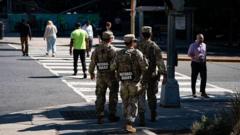Can Trump Use the National Guard in Portland? Appeals Court Says Yes!

Published: 2025-10-20 21:00:16 | Category: wales
This article explores the recent ruling by a US appeals court that permits President Donald Trump to deploy National Guard troops to Portland, Oregon. The court's decision overrides a previous order that blocked the deployment while legal challenges unfold, allowing around 200 troops to be stationed in Portland to protect federal buildings amid ongoing protests. This development raises important questions about authority, public safety, and the role of federal intervention in local matters.
Last updated: 28 October 2023 (BST)
Key Takeaways
- A US appeals court has allowed President Trump to deploy National Guard troops to Portland.
- Approximately 200 troops will be sent to safeguard federal buildings.
- The decision comes despite protests from state and city officials who claim the intervention is unnecessary.
- The ruling is part of a broader trend of federal military presence in Democratic-led cities.
- Oregon's Attorney General has raised concerns about the implications of the decision.
The Court's Ruling Explained
The decision by the San Francisco-based appeals court was delivered on 26 October 2023, following a hearing held on 9 October. The ruling comes after US District Court Judge Karen Immergut had enacted a temporary restraining order that prevented the deployment of the Oregon National Guard. The appeals court's ruling allows the federal government to proceed with its plans while the legal process is underway.
Context of the Deployment
The deployment of National Guard troops is framed within the context of ongoing protests in Portland, particularly outside an Immigration and Customs Enforcement (ICE) facility. These protests have persisted for months, with local leaders arguing that federal intervention is not warranted. The Department of Justice contended that the presence of troops was necessary to restore order and protect federal assets.
Implications for Local Governance
The ruling has sparked significant debate about the balance of power between federal and state authorities. Oregon Attorney General Dan Rayfield expressed concerns that this decision grants the president “unilateral power” to deploy state resources without sufficient justification. He indicated that this could set a precedent for further federal overreach into local affairs, raising alarms about the implications for democracy and governance in America.
What This Means for Portland
The deployment of approximately 200 National Guard troops is intended to create a buffer around federal properties, particularly in areas where protests have been most intense. The White House has defended the action, stating that it is within the president's lawful authority to protect federal assets in the wake of violent riots that local leaders are allegedly failing to manage.
Public Response and Local Leadership
Local and state officials have voiced strong opposition to the deployment. Portland's Mayor Ted Wheeler and Oregon's Governor Tina Kotek have both articulated that federal troops are not required to manage the protests, asserting that local law enforcement can handle the situation effectively. They argue that the presence of National Guard troops could escalate tensions rather than alleviate them.
Historical Precedent
This ruling is part of a broader pattern observed during President Trump's administration, where federal troops have been deployed to various cities facing unrest. Cities like Seattle and Chicago have also seen similar actions, which critics argue are politically motivated. The current situation in Portland exemplifies a clash not only over law enforcement strategies but also over broader political and social issues affecting the US.
The Legal Landscape
As this legal battle continues, the implications of the appeals court's ruling will be closely monitored. The decision allows the federal government to maintain its position while the issue is debated in courts, potentially influencing similar cases across the country. Legal scholars and political analysts are keenly observing how this precedent might shape future interactions between federal and state authorities.
What Happens Next?
In the coming weeks, the legal arguments will unfold further, with the Ninth Circuit Court of Appeals likely to face additional challenges regarding the deployment order. Oregon officials are expected to pursue every legal avenue to contest the ruling, potentially leading to a significant legal showdown that could redefine the boundaries of federal authority in states.
Conclusion
The ruling permitting the deployment of National Guard troops to Portland represents a critical juncture in the ongoing debate about federal intervention in local matters. As protests continue and legal challenges mount, the situation in Portland could serve as a bellwether for similar conflicts across the United States. The balance between maintaining public order and respecting local governance remains fraught with tension and uncertainty.
What does this ruling mean for the future of federal-state relations in America? Will it set a precedent for further federal intervention in local matters? #NationalGuard #PortlandProtests #FederalIntervention
FAQs
Why did the appeals court allow the National Guard deployment in Portland?
The appeals court ruled that deploying National Guard troops was a "measured response" to ongoing protests and aimed to protect federal buildings during legal challenges to the deployment.
What was the initial ruling by the district court regarding the National Guard?
US District Court Judge Karen Immergut issued a temporary restraining order blocking the deployment of the Oregon National Guard, arguing that there was insufficient justification for federal intervention.
What are local officials' views on the deployment of National Guard troops?
Local officials, including Portland's Mayor and Oregon's Governor, argue that the deployment is unnecessary and could escalate tensions in the city, asserting that local law enforcement can manage the situation effectively.
What historical context is relevant to this decision?
This situation mirrors previous instances during President Trump's administration where federal troops were deployed to various Democratic-led cities amidst unrest, raising questions about federal overreach and local governance.
What could happen next in the legal proceedings?
Oregon officials are expected to pursue further legal challenges against the appeals court's ruling, which could lead to a significant legal showdown regarding the limits of federal power in states.



